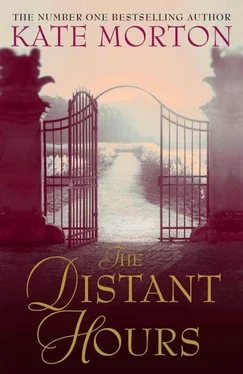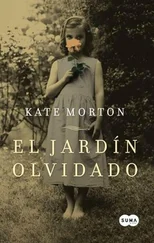His fervid expression, I noticed, had begun to droop. ‘None of these is about Milderhurst.’
‘I’m afraid not. Not directly anyway.’
‘But I was sure there’d be something.’
‘Sorry, Dad. It was the best I could do.’
He grimaced bravely. ‘Never mind, not your fault, Edie, and we mustn’t let ourselves become discouraged. We just need to think laterally.’ He knocked his pen against his chin then pointed it at me. ‘I’ve been going over the book all afternoon, and I’m positive it’s something to do with the moat. It has to be. It says in your book about Milderhurst that Raymond Blythe had the moat filled in just before he wrote the Mud Man .’
I nodded with all the conviction I could muster and decided against reminding him of Muriel Blythe’s death and Raymond’s subsequent show of grief.
‘Well, there you are then,’ he said brightly. ‘It must mean something. And the child in the window, stolen while her parents slept? It’s all in there, I just need to make the right connection.’
He turned his attention back to the articles, reading them slowly and carefully jotting notes in a quick, stabbing hand. I tried to concentrate, but it was difficult when a real mystery was preying on my mind. Eventually I fell to staring through the window at the dusky evening light; the crescent moon was high in the purple sky and thin sheets of cloud drifted across its face. My thoughts were with Theo and the brother who’d disappeared into thin air fifty years ago when he failed to arrive at Milderhurst Castle. I’d gone searching for Thomas Cavill in the hope I might find something that would help me better understand Juniper’s madness, and although that hadn’t happened, my meeting with Theo had certainly changed the way I thought of Tom. Not a cheat at all, but a fellow, if his brother was correct, who had been much maligned. Certainly by me.
‘You’re not listening.’
I glanced back from the window, blinked: Dad was watching me reproachfully over the top of his reading glasses. ‘I’ve been outlining a very sensible theory, Edie, and you haven’t heard a word.’
‘Yes, I have. Moats, babies…’ I winced, took a crack. ‘Boats?’
He huffed indignantly. ‘You’re as bad as your mother. The two of you are downright distracted these days.’
‘I don’t know what you’re talking about, Dad. Here.’ I leaned my elbows on my knees and waited. ‘Look, I’m all ears. Lay the theory on me.’
His chagrin was no match for his enthusiasm and he proceeded to do so at a skip. ‘It’s this report here that’s got me thinking. An unsolved kidnapping of a young lad from his bedroom in a manor house near Milderhurst. The window was left wide open, even though the nurse insisted she checked it when the children went to sleep, and there were marks on the ground that seemed to indicate a stepladder. It was 1872 so Raymond would’ve been six years old. Old enough for the whole event to have left quite an impression, don’t you think?’
It was possible, I supposed. It wasn’t impossible . ‘Definitely, Dad. That sounds very likely.’
‘The real clincher is that the boy’s body was found after an extensive search – ’ he grinned, proud of himself and stretching the suspense – ‘at the bottom of the muddy estate lake.’ His eyes scanned mine, his smile faltered. ‘What is it? Why do you look like that?’
‘I… because it’s rather awful. That poor little boy. His poor family.’
‘Well yes, of course, but it was a hundred years ago and they’re all long gone now, and that’s just what I’m saying. It must’ve been an awful thing for a little boy living in a nearby castle to hear his parents talking about.’
I remembered the locks on the nursery window, Percy Blythe telling me that Raymond was funny about security because of something in his childhood. Dad actually had a point. ‘That’s true.’
He frowned. ‘But I’m still not sure what it all has to do with the moat at Milderhurst. Or how the boy’s muddy body turned into a man who lives at the bottom of a mudded moat. Or why the description of the man emerging would be so vivid-’
A soft knock at the door and we both looked up to see Mum. ‘I don’t mean to interrupt. I’m just checking whether you’ve finished with your teacup.’
‘Thank you, dear.’ He held it out and she hesitated before coming to collect it.
‘You’re very busy in here,’ she said, pretending great interest in a tea drop on the cup’s outer curve. Blotting it with her finger and making every effort not to look in my direction.
‘We’re working on our theory.’ Dad winked at me, blissfully unaware that a cold front had cut his room in two.
‘I expect you’ll be a while then. I’ll say my goodnights and turn in. It’s been a rather tiring day.’ She kissed Dad on the cheek then nodded my way without actually making eye contact. ‘Good night, Edie.’
‘Night, Mum.’
Oh Lord, but it was so stiff between us! I didn’t watch her leave, pretending great interest instead in the printout on my lap. It happened to be the stapled set of pages Miss Yeats had sourced on the Pembroke Farm Institute. I glanced through the introduction which gave the group’s history: started in 1907 by a guy called Oliver Sykes – the name was familiar and I racked my brain before remembering it was the architect fellow who’d designed the circular pool at Milderhurst. It figured; if Raymond Blythe was going to leave money to a group of conservationists, they must’ve been people he had reason to admire. Ergo, he’d have employed the same people to work on his prized estate… Mum’s bedroom door closed and I breathed a sigh of something like relief. I laid down the papers and tried to act normally for Dad’s sake.
‘You know, Dad,’ I said, my throat gritty, ‘I think you might be on to something; that thing about the lake and the little boy.’
‘That’s what I’m talking about, Edie.’
‘I know. And I definitely think it could’ve been the inspiration for the novel.’
He rolled his eyes. ‘Not that, Edie; forget about the book. I’m referring to your mother.’
‘To Mum?’
He pointed at the closed door. ‘She’s unhappy and I don’t like to see her that way.’
‘You’re imagining things.’
‘I’m not daft. She’s been moping about the house for weeks, then today she mentioned that she’d found the letting pages in your room and she started to cry.’
Mum had been in my room? ‘Mum cried?’
‘She feels things deeply, she always has. Wears her heart on her sleeve. You’re similar that way, the two of you.’
And I’m not sure whether the comment was calculated to knock me off guard, but the very notion of Mum wearing her heart on her sleeve was so confounding that I lost all ability to insist that he was totally and utterly incorrect about us being similar. ‘What do you mean?’
‘It was one of the things I most liked about her. She was different from all the stiff upper lips I’d come across before. The first time I laid eyes on her she was having a good old cry.’
‘Really?’
‘We were at the pictures. By chance we were the only ones there. It wasn’t a particularly sad film, not that I could see, but your mum spent the whole time weeping in the dark. She tried to hide it, but when we got out into the foyer her eyes were as red as your T-shirt. I felt so sorry for her I took her out for cake.’
‘What was she crying about?’
‘I was never sure exactly. She cried rather easily in those days.’
‘No… really?’
‘Oh yes. She was very sensitive – funny, too; clever and unpredictable. She had a way of describing things that made you see them as if for the first time.’
Читать дальше












